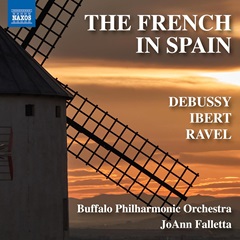Maurice Ravel, Jacques Ibert und Claude Debussy hatten enge Beziehungen zum Nachbarland Spanien – sei es durch familiäre Bindungen oder durch das Faszinosum der iberischen Musik mit ihrem Hauch von Exotismus.
Auf ihren Spuren wandern das Buffalo Philharmonic Orchestra und ihre Chefdirigentin JoAnn Falletta mit ihrem neuen Album. Sie nehmen uns mit auf eine Reise, die eher imaginär ist, die ein Gefühl von Fernweh verströmt.
Das beginnt mit einer fein differenzierten Ibéria von Claude Debussy in zarten, Aquarell ähnlichen Klangfarben, die wiederholt ein fahles Licht durchbrechen. Die exotischen, maurischen Einflüsse iberischer Musik werden sorgsam, aber – wichtiger noch – unaufdringlich herausgearbeitet: mehr Atmosphäre als reine Abbildung.
Ebenso vermitteln uns Orchester und Dirigentin in Jacques Iberts Escales eher den Traum von einem entfernten Ziel, dem wir in stimmungsvollen Klangfarben entgegen segeln. Die poetische Dimension hat auch in diesem Werk Vorrang vor dem Deskriptiven.
Maurice Ravel ist mit zwei Werken vertreten. Alborada del Gracioso eröffnet uns einen Einblick in das melancholische, wenn nicht gar traurige Seelenleben des Hofnarren – dies in einem reichen Spektrum an Klangfarben. Große klanglich Suggestivkraft hat auch die abschließende Rhapsodie espagnole – einmal mehr viel spanisches Flair und schwungvolle Rhythmik ohne einen Hauch von Postkarten-Nostalgie, was eben die Stärke dieses Albums ausmacht.
Maurice Ravel, Jacques Ibert, and Claude Debussy all had close ties to neighboring Spain, whether through family connections or a fascination with the exoticism of Iberian music.
With their new album, the Buffalo Philharmonic Orchestra and its principal conductor, JoAnn Falletta, follow in their footsteps. The album takes listeners on an imaginary journey, exuding a sense of wanderlust.
The journey begins with Claude Debussy’s finely differentiated Ibéria, with its delicate, watercolor-like timbres that repeatedly break through a pale light. The exotic, Moorish influences of Iberian music are carefully and unobtrusively brought out, emphasizing atmosphere over pure representation.
Similarly, in Jacques Ibert’s Escales, the orchestra and conductor convey a dream of distant destinations, to which we sail amid atmospheric timbres. In this piece, too, the poetic dimension takes precedence over the descriptive.
Maurice Ravel is represented by two pieces. Alborada del Gracioso provides insight into the melancholy inner life of the court jester through a rich spectrum of timbres. The concluding Rhapsodie espagnole also has great suggestive power in terms of sound. Once again, there is plenty of Spanish flair and lively rhythms, but no hint of postcard nostalgia. This is precisely what makes this album so strong.




















